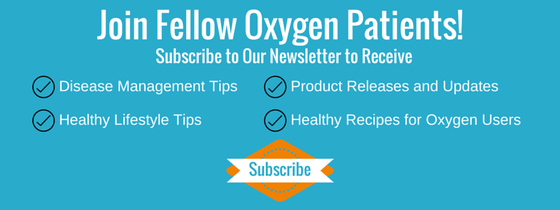
Back in December we met Larry Peel. Larry was diagnosed with COPD about 11 years ago and has been on supplemental oxygen for the past 7 years.
We got in touch with Larry because one of our owners saw a news report about him. He had received an oxygen concentrator from his insurance company, Kaiser but now they were wanting the unit back because they said that he had received it in error.
Larry explained that he needed the portable during his long shifts as a 911 operator but the insurance company still called his lifeline to oxygen, "non-essential".
Peel sometimes resorted to going without oxygen and trying to remain as still and calm as possible to avoid getting winded and triggering a coughing spell.
As you can imagine, in the life of a 911 dispatcher this was not always possible. It's estimated that patients who do not use their required oxygen increase their chances of heart failure or stroke by up to 50%.
With Larry's dosage he would need up to 5 or 6 heavy tanks to last him through a 10 or 12 hour shift. He feared that he would have to quit work, leaving this single dad unable to support himself and his son.
One of the news stations in Atlanta, where Larry lives covered his story and directed people to the GoFundMe account that he started in order to try and raise enough money to purchase his own Portable Oxygen Concentrator. Cory Luckner, one of the owners of 1st Class Medical, happened to see that report and decided he wanted to help. He and the rest of the executive team decided that an experienced 911 operator was too valuable to lose and that they wanted to make sure Larry could continue to do the important work that he does and continue to support his family.
When we talked to Larry the day after Christmas he was excited about the world that had just opened up to him. He received a SeQual Equinox for when he was out and about and an AirSep Visionaire to keep at work. He had just come off of two long holiday shifts was relieved that he was able to work long hours and maintain his oxygen levels.
____________________________________________________________________________________
Three months later we checked in on Larry to see how he was doing. The first words out of his mouth were, "My life is so much better now that I have that concentrator. You wouldn't believe how much easier it is!" He talked about all of the things that he was once again able to enjoy.
They were things that many of us take for granted, like grocery shopping, or just running his own errands, but to Larry they meant everything. He talked about the days he gets to take his granddaughter to the playground and how happy he is to be spending that time with her. For the first time, he got to speak to his son's class on career day about being a 911 operator.
Larry enjoys fishing and lives near a stocked pond but it just wasn't feasible to take tanks down to the banks. They would roll around and constantly tip over on the sand. Now that he has his SeQual Equinox he says he's looking forward to, "Catching his limit!"
Larry has also lost about 20 pounds since Christmas. He has stepped up his exercise routine but he attributes most of the weight loss to the fact that he's active again. "I think it's mostly because I'm not just sitting at home on the couch anymore."
Staying active and continuing to drop weight is going to slow the progression of Larry's COPD and may even improve it.
Using heavy tanks, or worse, going without oxygen is just going to cause a decline in a patient's condition. Insurance companies look at immediate cost saving benefits but don't take into account how much money a healthier patient saves in the long run.
An active patient who loses weight not only improves their respiratory condition but reduces strain on joints and bones as well, reducing the chance of needing replacements or developing arthritis. The link between a patients physical health and mental outlook is well documented.
A patient who maintains close ties with family and friends is likely to be able to stick to a healthier diet and exercise regimen, sleep better, and have more positive experience in general.
Many media outlets all over the country have been talking about Larry's story including the Miami Herald, Boston Globe and several TV Stations. It's important that this conversation continues. Being profitable and improving the health of patients can be both be achieved if insurance companies are willing to take a more holistic approach to financing health care.
If you run into problems with the insurance company, call your local insurance commission, they are there to help you and make sure you have all the info that you need to advocate for yourself.




